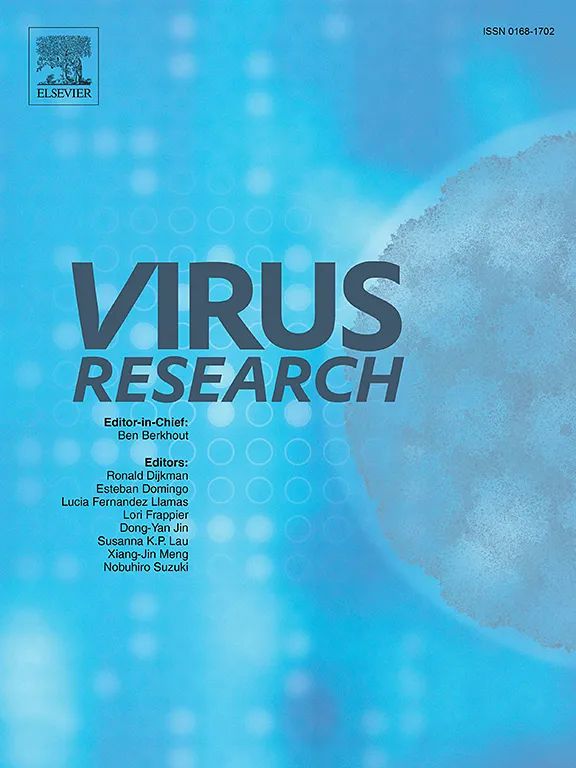南非自由州省 COVID-19 大流行之前和期间呼吸道合胞病毒的全基因组分子分析"[《病毒研究》,第 347 卷,2024 年 9 月,199421]更正。
IF 2.5
4区 医学
Q3 VIROLOGY
引用次数: 0
摘要
呼吸道合胞病毒(RSV)是全球儿童下呼吸道感染中最主要的病毒病原体。2019 年冠状病毒病(COVID-19)大流行以及由此产生的非药物干预措施扰乱了南非呼吸道病原体的传播模式。2020 年和 2021 年出现了季节性转变和 RSV 复发,并观察到几名受感染的儿童。2020 年至 2021 年期间,从南非布隆方丹自由州省的多家医院收集了常规 RSV 阳性鼻咽拭子,这些拭子来自呼吸窘迫和严重急性呼吸道感染的儿童。利用 Illumina MiSeq 平台对重叠的基因组片段进行扩增,并对完整的基因组进行测序。利用 GISAID 和 GenBank 中已发表的参考序列,对 RSV-A/-B G 基因进行了最大似然系统发育和进化分析。我们研究的菌株属于 RSV-A GA2.3.2 和 RSV-B GB5.0.5a 支系。在 COVID-19 大流行期间,RSV 的激增是由于在南非占主导地位并在全球流行的原有毒株也导致了这些淡季 RSV 的爆发。导致疫情复发的变异株与大流行前的菌株在系统发育上有关联,可能是大流行期间施加的限制导致免疫力下降的结果。受 COVID-19 大流行的影响,RSV 季节偏离了通常的模式,这突出表明有必要进行持续的基因组监测和基因变异的鉴定,以防止未来不可预见的疫情爆发。本文章由计算机程序翻译,如有差异,请以英文原文为准。
Corrigendum to “Whole genome molecular analysis of respiratory syncytial virus pre and during the COVID-19 pandemic in Free State province, South Africa” [Virus Research, Volume 347, September 2024, 199421]
Respiratory syncytial virus (RSV) is the most predominant viral pathogen worldwide in children with lower respiratory tract infections. The coronavirus disease 2019 (COVID-19) pandemic and resulting non-pharmaceutical interventions perturbed the transmission pattern of respiratory pathogens in South Africa. A seasonality shift and RSV resurgence was observed in 2020 and 2021, with several infected children observed.
Conventional RSV-positive nasopharyngeal swabs were collected from various hospitals in the Free State province, Bloemfontein, South Africa, from children suffering from respiratory distress and severe acute respiratory infection between 2020 to 2021. Overlapping genome fragments were amplified and complete genomes were sequenced using the Illumina MiSeq platform. Maximum likelihood phylogenetic and evolutionary analysis were performed on both RSV-A/-B G-genes with published reference sequences from GISAID and GenBank. Our study strains belonged to the RSV-A GA2.3.2 and RSV-B GB5.0.5a clades. The upsurge of RSV was due to pre-existing strains that predominated in South Africa and circulating globally also driving these off-season RSV outbreaks during the COVID-19 pandemic. The variants responsible for the resurgence were phylogenetically related to pre-pandemic strains and could have contributed to the immune debt resulting from pandemic imposed restrictions. The deviation of the RSV season from the usual pattern affected by the COVID-19 pandemic highlights the need for ongoing genomic surveillance and the identification of genetic variants to prevent unforeseen outbreaks in the future.
求助全文
通过发布文献求助,成功后即可免费获取论文全文。
去求助
来源期刊

Virus research
医学-病毒学
CiteScore
9.50
自引率
2.00%
发文量
239
审稿时长
43 days
期刊介绍:
Virus Research provides a means of fast publication for original papers on fundamental research in virology. Contributions on new developments concerning virus structure, replication, pathogenesis and evolution are encouraged. These include reports describing virus morphology, the function and antigenic analysis of virus structural components, virus genome structure and expression, analysis on virus replication processes, virus evolution in connection with antiviral interventions, effects of viruses on their host cells, particularly on the immune system, and the pathogenesis of virus infections, including oncogene activation and transduction.
 求助内容:
求助内容: 应助结果提醒方式:
应助结果提醒方式:


